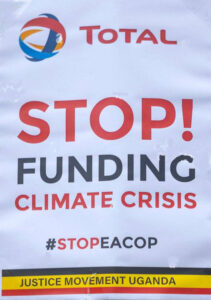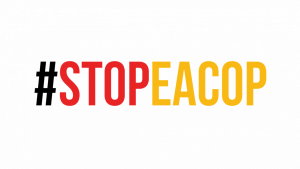
French oil company Total and the China National Offshore Oil Corporation (CNOOC) are pushing for the construction of the East African Crude Oil Pipeline (EACOP), the longest heated pipeline in the world, transporting about 200,000 barrels of crude oil per day from Uganda to the Tanga port in Tanzania. The project threatens to displace thousands of families and farmers from their land. The land acquisition process has already begun, raising the question whether the rights of indigenous communities to Free, Prior and Informed Consent has been respected in accordance with international standards.
Total is facing a historical lawsuit in France for its failure to prevent human rights violations and environmental damage linked to these oil exploration projects. Total’s decision to move forward with opening a new oil frontier in Africa is in contradiction to their communication strategy that depicts the oil major as climate conscious, responsible, multi-energy company. Extraction of oil in Uganda generates up to 34 million tons of carbon emissions each year. EACOP will bring climate chaos and biodiversity loss and is already causing serious human rights violations. We need to #StopEACOP.
Building the biggest heated oil pipeline in the world is very expensive. Total and CNOOC are in need of a 3 billion USD debt finance from some of the world’s largest commercial banks to get this project off the ground. Standard Bank, through its subsidiary Stanbic Uganda, along with the Industrial and Commercial Bank of China (ICBC), are acting as financial advisors to the project. These banks are expected to serve as lead arrangers, meaning they will need to approach other banks to co-finance the deal. The #StopEACOP alliance has written to each of those banks, urging them to rule out supporting EACOP in any way publicly. Thanks to the international mobilization, 24 banks have already pulled out. Below we list the banks in three groups:
- Banks actively supporting EACOP: Standard Bank (South Africa), ICBC (China).
- Banks that declined to answer or do not rule out to finance EACOP: Agricltural Bank of China (China), Bank of China (China), China Construction Bank (China), China International Capital Bank (China), BBVA (Spain), OCBC Bank (Singapore), Goldman Sachs (USA), Bank of America (USA).
- Banks that ruled out to support EACOP project: SMBC (Japan), Mitsubishi UFJ Financial Group (Japan), Standard Chartered (UK), Santander (Spain), Natixis (France), Investec (South Africa), ANZ (Australia), CityGroup (USA), Barclays (UK), First Rand (South Africa), Credit Agricole (France), Deutsche Bank (Germany), BNP Paribas (France), Credit Suisse (Switzerland), HCBC (UK), Mizuho (Japan), Morgan Stanley (USA), Royal Bank of Canada (Canada), JP Morgan (USA), UniCredit (Italy), Societe Generale (France), Nedbank (South Africa), UOP (Singapore), Wells Fargo (USA), DZ Bank (Germany), Intesa SanPaolo (Italy).
YOU can still send your own message to the banks that are most likely to consider financing the pipeline. Support the #StopEACOP campaign! Though lots needs to be done to limit climate change and create a better future for everyone, it is clear that stopping the East African Crude Oil Pipeline is a critical first step.

